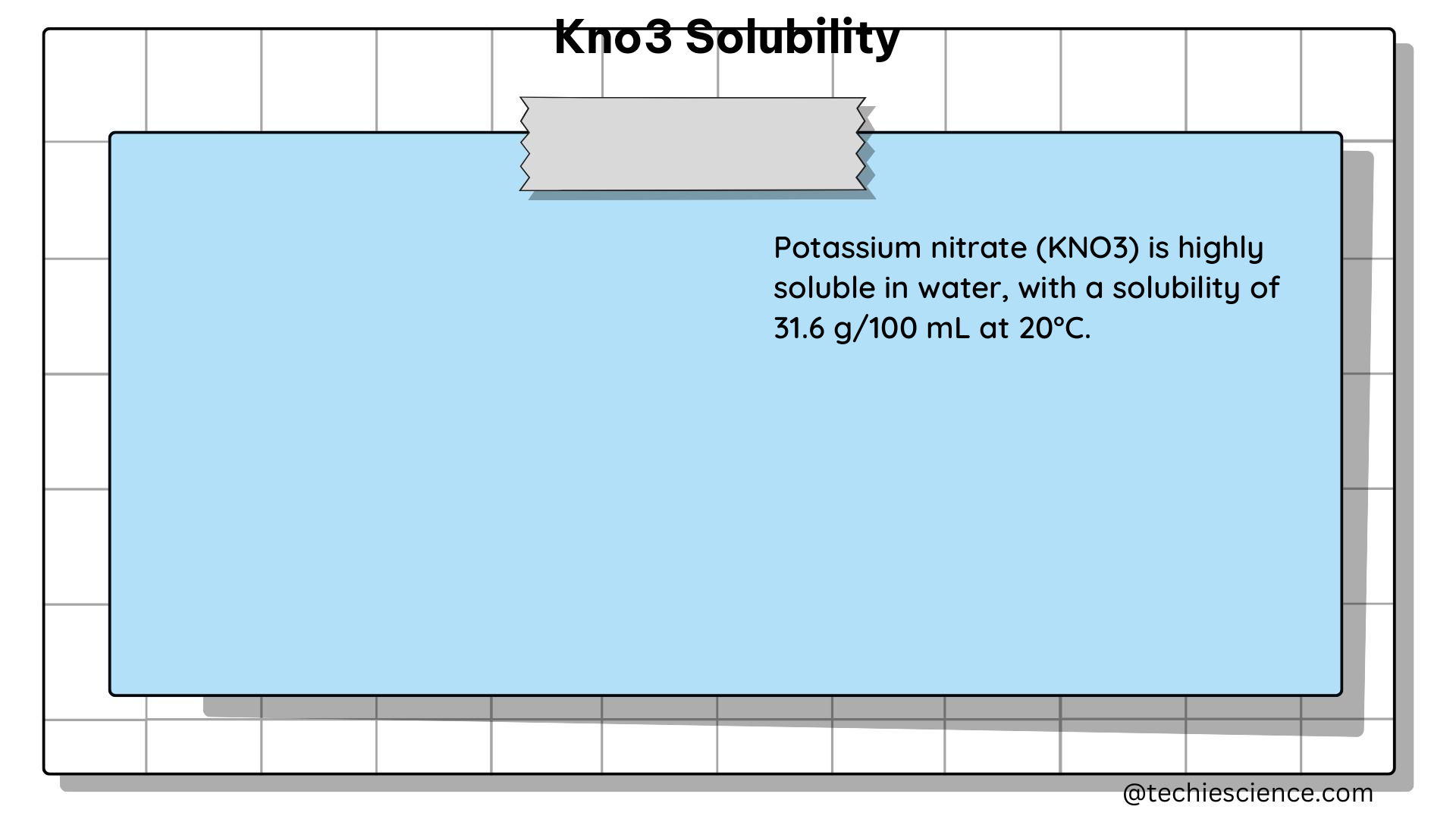Summary
Potassium nitrate (KNO3) is a widely used chemical compound with diverse applications, from fertilizers to pyrotechnics. Understanding the solubility of KNO3 in water is crucial for various industrial and scientific processes. This comprehensive guide delves into the intricate details of KNO3 solubility, exploring the underlying principles, experimental data, and practical implications.
Understanding KNO3 Solubility

Theoretical Foundations
The solubility of KNO3 in water is governed by the principles of thermodynamics and the interactions between the solute (KNO3) and the solvent (water) molecules. According to the Gibbs free energy equation, the spontaneity of a dissolution process is determined by the change in Gibbs free energy (ΔG), which is a function of the change in enthalpy (ΔH) and the change in entropy (ΔS):
ΔG = ΔH – TΔS
Where T is the absolute temperature.
For the dissolution of KNO3 in water, the process is endothermic (ΔH > 0), meaning that energy is absorbed from the surroundings. The increase in entropy (ΔS > 0) due to the increased disorder of the system also contributes to the spontaneity of the dissolution process.
As the temperature increases, the kinetic energy of the molecules increases, leading to more frequent collisions and interactions between the solute and solvent. This enhanced molecular motion facilitates the dissolution of KNO3, resulting in an increase in solubility.
Experimental Data and Solubility Curves
Numerous experiments have been conducted to determine the solubility of KNO3 in water at various temperatures. The following table presents some of the experimental data:
| Temperature (°C) | Solubility (g KNO3 per 100 g water) |
|---|---|
| 27 | 46.43 |
| 47 | 59.10 |
| 54 | 81.25 |
| 81 | 180.00 |
These data points can be used to construct a solubility curve, which graphically represents the relationship between temperature and the solubility of KNO3. The solubility curve typically exhibits a positive slope, indicating that the solubility of KNO3 increases as the temperature rises.

The solubility curve can be used to predict the maximum amount of KNO3 that can be dissolved in a given volume of water at a specific temperature. This information is crucial for various applications, such as the preparation of supersaturated solutions, the recrystallization of KNO3, and the optimization of industrial processes involving KNO3.
Factors Affecting KNO3 Solubility
In addition to temperature, several other factors can influence the solubility of KNO3 in water:
-
Pressure: The solubility of KNO3 is generally not significantly affected by changes in pressure, as the dissolution process does not involve a significant volume change.
-
pH: The solubility of KNO3 is relatively independent of the pH of the solution, as it is a neutral salt that does not undergo protonation or deprotonation reactions.
-
Presence of other solutes: The presence of other dissolved substances in the solution, such as other salts or organic compounds, can affect the solubility of KNO3 through various intermolecular interactions and the common-ion effect.
-
Particle size: The surface area-to-volume ratio of the KNO3 particles can influence the dissolution rate and, consequently, the observed solubility. Smaller particles generally have a higher surface area, leading to faster dissolution.
Understanding these factors is crucial for optimizing the dissolution and recrystallization processes of KNO3 in various applications.
Practical Applications of KNO3 Solubility
The knowledge of KNO3 solubility has numerous practical applications in various fields, including:
Fertilizer Production
Potassium nitrate is a widely used fertilizer due to its high solubility and ability to provide both potassium and nitrogen to plants. The solubility data is essential for the efficient formulation and application of KNO3-based fertilizers.
Pyrotechnics and Explosives
KNO3 is a key ingredient in many pyrotechnic and explosive compositions, where its solubility and ability to oxidize other materials are crucial. Understanding the solubility behavior is important for the safe and controlled production of these materials.
Pharmaceutical and Medical Applications
Potassium nitrate is used in some pharmaceutical and medical products, such as toothpaste for treating sensitive teeth. The solubility data is necessary for the proper formulation and dosage of these products.
Analytical Chemistry
KNO3 is commonly used as a standard in various analytical techniques, such as ion chromatography and atomic absorption spectroscopy. The accurate knowledge of its solubility is essential for the preparation of standard solutions and the interpretation of analytical results.
Crystallization and Purification Processes
The solubility data of KNO3 is crucial for the design and optimization of crystallization and purification processes, such as recrystallization, fractional crystallization, and solvent extraction.
Energy Storage and Conversion
Potassium nitrate is used in some thermal energy storage systems and concentrated solar power plants, where its solubility and phase change properties are important for efficient energy storage and conversion.
Conclusion
The solubility of potassium nitrate (KNO3) is a fundamental property that has far-reaching implications in various scientific and industrial applications. This comprehensive guide has explored the theoretical foundations, experimental data, and practical applications of KNO3 solubility, providing a valuable resource for researchers, scientists, and professionals working with this versatile chemical compound.
References
- Lide, D. R. (Ed.). (2004). CRC handbook of chemistry and physics (Vol. 85). CRC press.
- Atkins, P., & de Paula, J. (2014). Atkins’ physical chemistry. Oxford university press.
- Mullin, J. W. (2001). Crystallization. Butterworth-Heinemann.
- Knovel Critical Tables. (n.d.). Potassium Nitrate (KNO3) Solubility in Water. Retrieved from https://app.knovel.com/web/toc.v/cid:kpKCT00005/viewerType:toc/
- Weast, R. C. (1984). CRC handbook of chemistry and physics (Vol. 65). Boca Raton, FL: CRC press.

The lambdageeks.com Core SME Team is a group of experienced subject matter experts from diverse scientific and technical fields including Physics, Chemistry, Technology,Electronics & Electrical Engineering, Automotive, Mechanical Engineering. Our team collaborates to create high-quality, well-researched articles on a wide range of science and technology topics for the lambdageeks.com website.
All Our Senior SME are having more than 7 Years of experience in the respective fields . They are either Working Industry Professionals or assocaited With different Universities. Refer Our Authors Page to get to know About our Core SMEs.